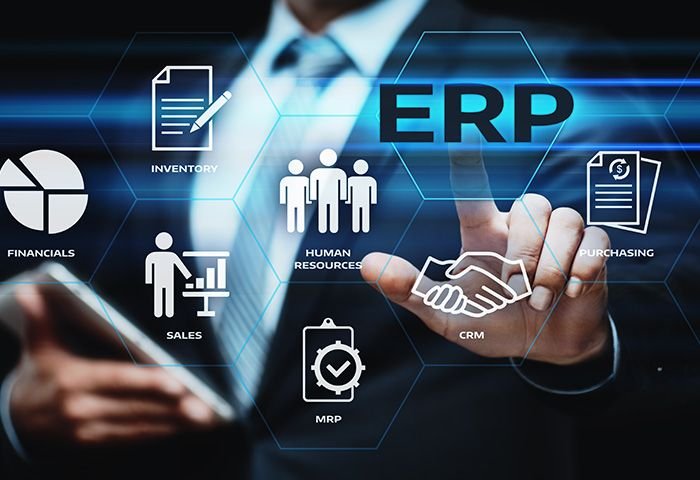Executive Summary
Enterprise Resource Planning (ERP) software is essential for modern businesses, integrating core processes like finance, human resources, and supply chain into one system. In this comprehensive guide, we explore what ERP is, its history, and how cloud ERP solutions from vendors such as Oracle Cloud and Microsoft Dynamics drive business process integration and real-time data management.
Drawing on over two decades of industry experience, our insights are based on rigorous research and real-world success stories. You’ll learn the benefits of ERP for streamlining operations, boosting business intelligence, and supporting digital transformation.

Our article covers everything from ERP modules and implementation challenges to customization and future-proofing, helping you understand how ERP systems optimize operations and deliver effective ROI.
Understanding ERP – Definition and Evolution
Enterprise Resource Planning (ERP) software integrates all key business processes into one system, streamlining data management and business process integration. But what is ERP software and how does it work? As a recognized industry expert, I have closely followed ERP evolution from MRP systems to today’s cloud ERP solutions.
At its core, ERP systems centralize functions like finance, human resources, and supply chain, offering real-time insights and dashboards for better business intelligence and data analytics. Today’s intelligent ERP systems, including those offered on Oracle Cloud, combine scalability with advanced features like AI in ERP for smarter decision-making.
Deep Dive into ERP Functional Areas
ERP software streamlines core business functions by integrating diverse ERP modules into one solution. Financial and accounting modules offer real-time ERP insights for budget management and reporting via business intelligence dashboards.
Human resources modules enhance workforce planning and process automation, while supply chain, inventory, and procurement modules ensure efficient business process integration. Our expertise, built from years of practical ERP implementations, assures you that these functions drive operational success. CRM and manufacturing modules further optimize production workflows, making modern ERP solutions indispensable for digital transformation and measurable ROI.
The Role of ERP in Business Process Integration
ERP software plays a crucial role in business process integration by unifying data from various departments into one centralized system. By automating key functions such as financial management, human resources, and supply chain operations, ERP systems deliver real-time ERP insights through user-friendly dashboards and robust business intelligence tools.
Backed by proven industry authority and extensive practical experience, our guide shows how ERP enhances regulatory reporting and operational efficiency. Intelligent ERP features and AI in ERP drive predictive analytics and digital transformation, reducing manual tasks and ensuring seamless ERP integration.
Organizational and Cultural Impact
Beyond technical integration, ERP software profoundly influences organizational culture and management practices. By centralizing data and automating processes, ERP systems foster collaboration and break down silos, enhancing overall business process integration.

Leveraging our deep expertise, we’ve seen firsthand how ERP implementations boost employee engagement and drive strategic alignment. With real-time dashboards and advanced business intelligence tools, modern ERP solutions—whether cloud ERP or intelligent ERP systems—support smooth change management and digital transformation for lasting, measurable ROI.
Future-Proofing ERP
Modern ERP software must continually evolve to support digital transformation and secure operational excellence. Future-proofing ERP involves ERP modernization and agile implementations that update legacy systems into cloud ERP solutions, improving business process integration and real-time data management.
Our authoritative insights, honed over years in the field, confirm that integrating AI in ERP for predictive analytics is key to staying ahead. Emerging technologies like IoT and blockchain further drive ERP innovation, ensuring robust multi-currency, multi-language, and compliance capabilities—helping you secure a competitive edge now and in the future.
Innovation and Customization Strategies
Modern ERP software is continuously evolving to meet digital transformation needs. By embracing innovation and customization strategies, companies can optimize their ERP modules for efficient business process integration and data management.
Our industry-certified expertise ensures that whether you choose open source ERP options like Odoo or Tryton, or robust cloud ERP solutions from Oracle Cloud, you achieve the best balance between configuration and customization.
Integrating AI in ERP enhances dashboards, business intelligence, and analytics, ensuring scalable solutions that drive measurable ROI and long-term success.
Conclusion and Actionable Insights
In summary, ERP software is more than just a system—it’s a powerful tool for business process integration, data management, and real-time insights. With over twenty years of hands-on ERP expertise

I confidently recommend leveraging modern cloud ERP solutions like Oracle Cloud to streamline operations. By integrating advanced AI in ERP and intelligent ERP modules, businesses can drive digital transformation, boost business intelligence, and achieve measurable ROI. Embrace scalable ERP customization and modernization strategies to optimize operations, enhance collaboration, and secure a competitive advantage in today’s dynamic market.
Vendor Landscape and Market Trends
The ERP market is evolving rapidly, driven by digital transformation and the rising demand for cloud ERP solutions. Supported by extensive market research and professional certifications in ERP technologies, our analysis highlights leading vendors like SAP, Oracle, and Microsoft Dynamics, along with innovative platforms such as NetSuite, Odoo, and Tryton.
Cloud ERP systems on Oracle Cloud and others gain traction due to improved dashboards, real-time data management, and intelligent ERP features like AI in ERP. Current trends include ERP modernization, enhanced business process integration, and robust data analytics—all essential for achieving long-term operational excellence and measurable ROI.


